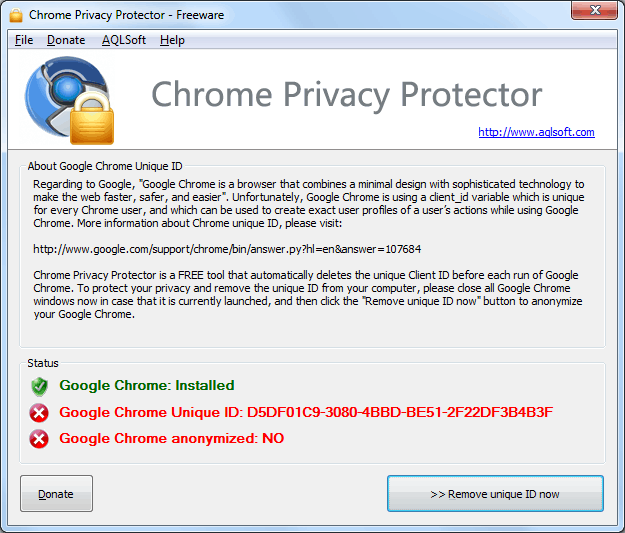Google Chrome Privacy Protector

Some Internet users are reluctant to use Google's web browser Google Chrome due to privacy concerns. These concerns are not just based on thin air but on the fact that data is transmitted between the Google browser and Google servers, and that Google is first and foremost an advertising company.
Part of the data that is being transferred is also transferred by other web browsers. This includes error reporting for instance which submits crash reports to company servers.
Chrome ships with unique information on the other hand and one of them is a unique identifier called Client ID.
A unique Client ID is assigned to every installation of Google Chrome which theoretically gives Google information to identify all users of its browsers based on that.
But what exactly is the Client ID for? The privacy policy of the Google Chrome browser states:
The client ID is used for the user metrics service. This is an opt-in service that lets users send usage statistics to Google so that we can learn how Google Chrome is being used for the sake of making improvements. It helps us answer questions like, "Are people using the back button?" and "How common is it that people click the back button repeatedly?" Users can always update their preference about sending usage statistics.
The Client ID is therefore not needed to run the Google Chrome web browser. It is also likely that the majority of Google Chrome users is not making use of the metrics service.
Update: It appears that Google is no longer assigning permanent unique IDs to Chrome installations. Instead, an ID is only assigned when users sign in to a Google account as it is being used to sync data among other things. Consult Google's privacy policy for additional information.
Chrome users have two options to deal with the Client ID: They can switch to a compiled version of Google Chrome that does not come with a unique Client ID (see SRWare Iron) or by using a program like Google Chrome Anonymizer which removes the Client ID from the program.
Another program that was recently reviewed over at Life Rocks 2.0 is the Google Chrome Privacy Protector.
Attention: The program ships with third-party offers. Make sure you hit the decline button if you are not interested in them.

The program scans the computer system for a Google Chrome installation and displays whether the Client ID of the web browser has been anonymized yet.
A click on the Remove unique ID now button will do that if it has not been done already. All instances of Google Chrome need to be closed for that operation.
Chrome Privacy Protector is available at the developer's website where it can be downloaded for all Windows operating systems.
Please note that it has not been updated since 2011. The project appears dead, and it may not be compatible with recent versions of the Google Chrome browser because of this.


























You mention the anonymizer and the protector. Apparently they are the same app.
From http://blog.gjl-network.net/archives/166-google-chrome-chrome-privacy-guard-cpg.html:
IMPORTANT NEWS: The Chrome Anonymizer(TM) has been renamed to Chrome Privacy Guard
(CPG)! If you are looking for Chrome Anonymizer(TM) you are at the right place!
Looking for a good man th hat loves kids and no how to treat a women will respect
Agree, UnChrome.
It´s just requires one run and you are set, though would be more handy an option to manually select the installation directory for flash drives (in case you are running a portable version)
There’s an independence chromium build called Iron which strips out all unnecessary privacy component. I recommend using it. It’s Chrome, without google watching you.
link, http://www.srware.net/en/software_srware_iron.php